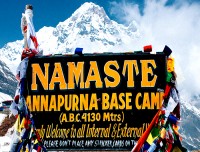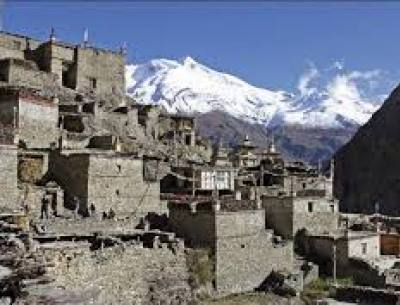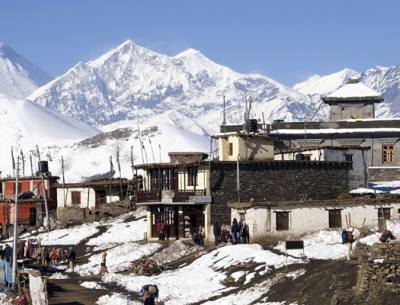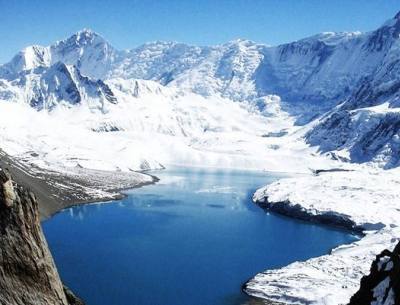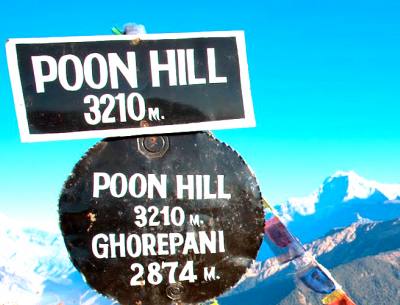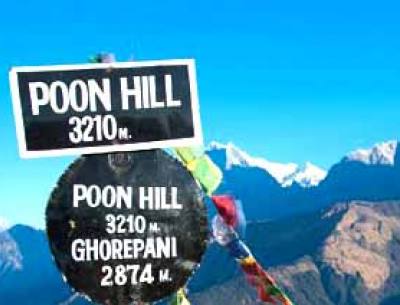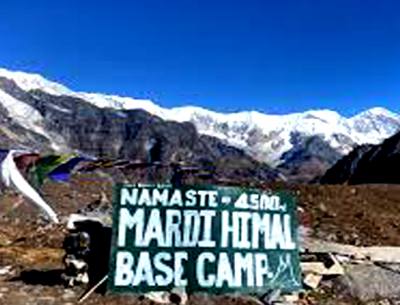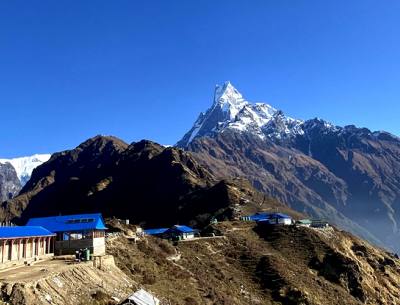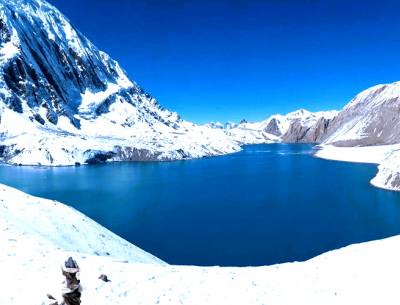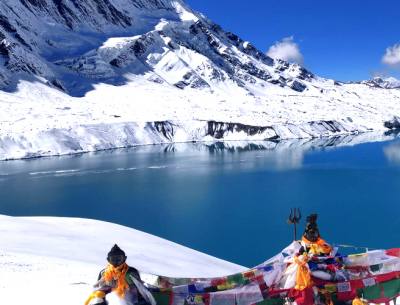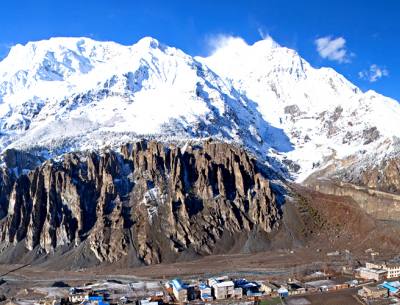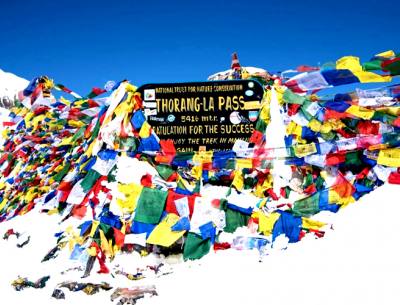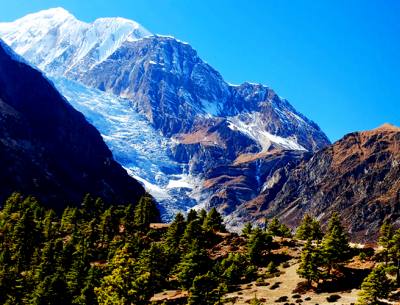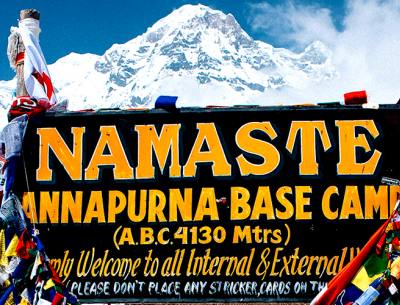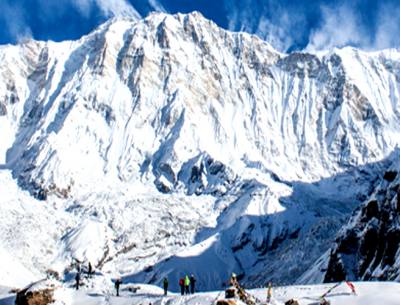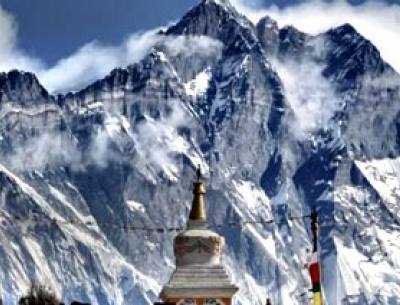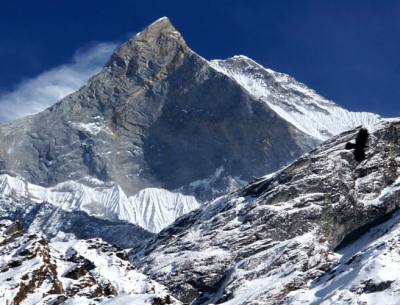Annapurna Base Camp Trekking | 13 Days
The Annapurna Base Camp (ABC) Trek via Poon Hill is one of the best trekking in the world. Annapurna Base Camp Trekking offers trekkers breathtaking views of the Annapurna Massif and a close-up experience of the majestic Himalayan peaks. The Trek is an amazing trekking that combines Ghorepani Poon Hill with Annapurna Base Camp, two separate treks
The Trek is an amazing trekking that combines Ghorepani Poon Hill with Annapurna Base Camp, two separate treks in the countryside. Annapurna Base Camp Trekking is the Lesser Part Trek that is bounded by 8 high mountains peaks: Him Chuli 6,441 M, Annapurna South 7,219 M, Annapurna I 8,091 M, Singa Chuli 6,501 M, Ten Peak 5663 M, Gangapurna 7,455 M, Annapurna III 7,555 M, and Machhapuchhre Himal 6,993 M, it is a cover-surrounded ideal Destination, The Annapurna Base Camp Trekking one of the most popular Hiking in the Annapurna Region. Annapurna Base Camp Territory is in the inner first and largest Annapurna Conservation Area Project (ACAP) and the entire massif Annapurna Himalayas surrounding areas which are protected within the 7,629-square-kilometre 2,946 sq mi. the Annapurna base camp Territory has thirteen peaks over 7,000, including one peak over 8,000 meters which is Annapurna I. Annapurna Base Camp Trekking Via Poon Hill 13-day Itinerary leads up Ghorepani Poon Hill’s 3,210-meter scenic view of Point, in the beginning, and continues via Tadapani, Chomrong, Himalaya Hotel, MBC, and ABC. the Ultimate destination is Annapurna Base Camp, 4,130 m altitude above seas leaves Annapurna Base Camp Trek of your journey experience.
This Annapurna Base Camp Trekking itinerary is for you from our package, which is built to be harnessed for travel enthusiasts like you. It is highly diverse with its planned days over the trail in the tranquility of the Annapurna region. Stick with Us Here to Get Proper and Detailed Information About the Itinerary of This Trekking Journey.
Trip Highlights
- You'll pass through forests of rhododendron and rivers and high-altitude desert areas.
- Poon Hill is one of the best sunrise views point (3,210 m) spots in Nepal.
- panoramic views of Dhaulagiri, Annapurna, and Machhapuchhre (Fishtail).
- Experience the culture of the Gurung and Magar communities Village.
- Visit the Gurung villages of Chomrong.
- Diverse Nature of Annapurna Region Covering the Himalayan Topography
- Witnessing the Stunning Panoramic Views of Several Mountain Ranges as well as the Glimpse of Towering Peaks
- Experiencing the Spectacular Beauty of Annapurna Tranquillity
- Witnessing the Diverse Ecosystem of Rare Flora and Fauna That Are Only Found Over High Altitude
- Witnessing the Wildlife Consisting of the Wide Range of Wildlives
- Experiencing the Cultural Interaction of Traditional Society
- Witnessing the Beauty and the Living of Different Ethnic People of the Himalayan Region
- Journey Over the Beautiful Terrains and The Beautiful Villages All Across the Trail
- Adventure with The Remoteness and The Rough Journey Over the Trail of This Trekking Journey
- Stunning panorama views of some of the highest peaks in the world, including Annapurna I (8091 m), Machapuchare (6993 m), Dhaulagiri (8167 m).
- Annapurna Base Camp Trek 4130 M height.
- Wonderful Journey, Annapurna Base Camp Trek.
Itinerary
- 1Arrival at Tribhuvan International Airport, KathmanduOne of our representatives will pick you up from Tribhuvan International Airport, Kathmandu, and escort you to your hotel. You will be briefed about the programs scheduled for the next day. Overnight stay at the hotel.
- 2Drive from Kathmandu (1365M) To Pokhara (825M) Duration 7 - 8 HoursToday in the morning, you will get your breakfast and get ready for the road trip to Pokhara. It will take us the drive duration of 6-7 hours through the terrain highway of mid-hill Nepal. So, it is going to be a scenic drive as well as a very mesmerizing journey throughout the driven hill of mid-hill terrain. After you arrive at Pokhara, you will witness the magical beauty of nature in a modern city. This lakeside city can be regarded as the best example of a Himalayan city with the lake on its side with a massive view of Macchapuchre (Mt. Fishtail).
- 3Drive from Pokhara To Birethanti, And Trek to Ulleri (2010M) Duration 6 -7 Hours.We will drive around 1:25 hrs from Pokhara via attractive Lumle Village, perched on the mountainside, and then on to Birethanti (1,025 M) where you will be asked for your tourist permit at the checkpoint. The trail takes us through the beautiful rhododendron forest and then follows the Modi River with a stop at a teahouse along the way, and after a 5-6 hour trek, we reach the lush green village of Ulleri.
- 4Trek from Ulleri (2010M) to Ghorepani (2,874M) Duration 5 - 6 hours.Our trek today starts with a 45-minute, fairly steep climb up to Magar village of Banthanti, from where we are blessed with magical views of Mt. Machapuchare (6997M), Hiunchuli (6441M) and Annapurna South (7219M). After following the trail through a lush, pink-flowering rhododendron forest, we cross a small bridge before reaching the village of Ghorepani, where enormous peaks, such as Dhaulagiri, Annapurna South, Hiunchuli, and Annapurna, loom in the background. This is a fantastic place to sit and take in the exquisite views.
- 5Hike Up to Poon Hill Viewpoint (3210M) And Trek to Tadapani (2,710M) Duration 6 - 7 Hours.Poon Hill is justifiably well known for offering unheralded views of the Annapurna Ranges—especially at sunrise and sunset. An early start will see us reach the Poon Hill viewpoint, where we can watch the changing colors reflecting off the mountains, such as Dhaulagiri (8167M), Annapurna I (8091M), Annapurna II (7937M), Annapurna III (7855M), Annapurna IV (7525M), Annapurna South (729M), Nilgiri (6940m), Tukuche (6920m), Varaha Shikhar (7847M) & Lamjung Himal (6931m). After sending your camera into overdrive, we will return to a well-deserved breakfast at Ghorepani, after which we head to Tadapani Village via the scenic trail passing through Deurali (meaning ridge in Nepali) and teahouses until we reach Tadapani. Overnight stay at the teahouse.
- 6Trek from Tadapani (2,710M) To Chomrong (2,170M) Duration 6 - 7 Hours.The trek from Tadapani descends through unspoiled oak and rhododendron forests with views of the Annapurnas along the way. We stop for lunch at Kimrong Khola (river), a tributary of the Modi Khola River. From here the trail ascends for 1-2 hours before reaching the ridge, where it becomes easier before reaching Chomrong Village.
- 7Trek from Chomrong (2,170M) To Dovan (2,600M) Duration 5 - 6 Hours.Today the trail descends to Chomrong Khola before taking us upward to Khuldighar (2,380 M) where there is an Annapurna Conservation check point. ACAP (Annapurna Conservation Area) check post. We then head down into the valley and follow the river, passing through a bamboo grove before taking a steep path to Dovan.
- 8Trek from Dovan (2,600M) To Deurali (3,200M) Duration 3 - 4 Hours.Today, we follow the trail up through the rhododendron forest alongside the Modi Khola (river) to the Himalaya Hotel (2920M), with a stop for lunch along the way before heading to Hinku Cave, which used to be a place for early explorers to stop and replenish their supplies. We then continue along the trail until we reach Deurali (3200M).
- 9Trek from Deurali (3,200M) To Annapurna Base Camp (4,130M) Duration 5 - 6 Hours.Today is the highlight of your trek as you make your way to Annapurna Base Camp! Departing from Deurali, the trail ascends through the breathtaking Annapurna Sanctuary. As you gain altitude, the views become increasingly spectacular, with majestic mountains rising around you. Upon reaching Annapurna Base Camp, you’ll be surrounded by some of the highest peaks in the world, including Annapurna I and Machapuchare (Fishtail Mountain). Take in the awe-inspiring scenery and reflect on your incredible journey. Spend the night at base camp, enveloped by the grandeur of the Himalayas.
- 10Trek from Annapurna Base Camp (4,130M) To Sinuwa (2,350M) Duration 7 - 8 Hours.After an unforgettable experience at ABC, begin your descent back to Sinuwa. The trail leads you back through the Annapurna Sanctuary, offering different perspectives on the stunning scenery. Enjoy the lush landscapes and vibrant flora as you retrace your steps. The descent may be challenging, but the beautiful views and fresh mountain air will keep your spirits high. Upon reaching Sinuwa, take the time to rest and reflect on your journey as you prepare for the final leg back.
- 11Trek from Sinuwa (2,350M) To Jhinu Danda (1780 M) And Drive to Pokhara (827M) Duration 7 - 8 Hours.On your final day, trek from Sinuwa back to Jhinu Danda. The trail features a mix of ups and downs, allowing you to savor the beautiful surroundings one last time. After arriving in Jhinu Danda, take a break before embarking on your drive back to Pokhara. The journey back provides a perfect opportunity to reflect on your adventure through the Annapurnas. Once in Pokhara, celebrate your achievement and perhaps explore the vibrant lakeside area, concluding a memorable trek.
- 12Drive Back from Pokhara (825M) To Kathmandu (1400M) Duration 7 - 8 HoursToday we head back on a 7- to 8-hour drive to Kathmandu with many fond memories of Nepal and its unique culture and geography. These memories will last a lifetime! And Shopping
- 13International Departure for Homeward BoundAs per your international flight time transfer towards Tribhuvan International Airport for the journey back home or to respective destinations after a super and amazing time in the Nepal Himalaya on the Annapurna Base Camp Trekking 13 Days.
Cost Includes:
- Airport Pickup and Drop-Off by Private Vehicle
- Two Night’s Accommodation with Breakfast at A Standard Hotel in Kathmandu
- Two Night’s Accommodation with Breakfast at A Standard Hotel in Pokhara
- Transportation by Tourist Bus from Kathmandu To Pokhara And Pokhara To Kathmandu
- Private transportation, including from Pokhara to Birethanti and also from Jinudada Bridge to Pokhara
- Full board meals, breakfast, lunch, and dinner, during the trek in the mountain
- Fresh fruits every night after dinner
- Accommodation is in the best available twin-sharing room lodges during the trek.
- An experienced English-speaking (trekking guide)
- Strong, helpful Sherpa porters service (2 trekkers: 1 porter),
- All food, accommodation, insurance, and transportation for the porter and guide.
- Trekking guide and porter’s salary.
- We provided a sleeping bag, down jacket, duffel bag, and walking poles. The down jacket, duffel bag, and sleeping bag are to be returned after the completion of the trip.
- A comprehensive first-aid medical kit
- Annapurna Conservation Area Project (ACAP) entry permit and Tourist Information Management System (TIMS) permit
- Reasonable Treks And Tour T-shirt
- Assistant guide for groups of 8 or more people
- Trip achievement certificate after successful trip completion.
- All government and local taxes
Cost Excludes:
- Meals not including Kathmandu and Pokhara
- Extra Night Hotel Accommodation Kathmandu or Pokhara
- Travel insurance
- International airfare
- Nepal Entry Visa Fee
- All kind of cold drinks, including water, Coke, Fanta, juice, etc.
- All the alcoholic and nonalcoholic drinks, soup, tea, coffee, hot chocolate, Coca-Cola, mineral water, extra food, and cold and hot drinks on the trek (i.e., those you choose to purchase along the way and during evenings in the tea houses)
- All desserts & sweet things like chocolate, cake, pie, and pudding.
- Hot shower and battery charging at the tea houses.
- Wi-Fi internet Not included during the trek
- Personal trekking equipment
- Tips for airport representative, tour guide, trekking staff, drivers, etc.
Trip Note
Annapurna Base Camp Trekking Trip Note
Sheltered by the Annapurna Massif, is the Annapurna Base Camp Trekking. harbors bewitching natural wonders and graceful ethnic communities. Annapurna, literal meaning in Nepali being the giver of food and nourishment, has civilizations that have flourished in its lush hills and the dry rain shadow areas alike. To trek through this region is a dream for most trekkers as it combines most things they seek for in one package. Iconic peaks such as the Machhapuchhre (6997m) and Hiunchuli (6441m) along with the notoriously dangerous and massive Annapurna (8091m) lie in this region. Dotted around the trails are villages of the charming Gurung, Manangi and the Thakali communities.
Accommodation on Annapurna Base Camp Trekking
Nepali are known to be naturally graceful in nature. It's no different in the Annapurna Base Camp Trekking. Teahouses have sprung around the trekking regions, where you go from one teahouse to the next till you complete the trek. Tea houses offer basic accommodation and meals. These lodges are located along the routes and offer basic twin rooms, attached or common bathrooms, a dining room, and the ability to use wifi or take a hot shower at an extra cost. In addition to this, there are options for luxury treks where you can spend time on wonderful lodges and mini-hotels, which provide you with the most luxurious experience if you are ready to pay.
Transportation On Annapurna Base Camp Trekking
You can take a flight, bus or hire a vehicle to travel to the Annapurna Base Camp Trekking The most famous starting point of any trips in the Annapurna region is Pokhara. There is an established trekking infrastructure, with easy access to start the trek at around an hours’ distance from Pokhara. From Pokhara, you have a choice if you want to start your trek right away or travel to the next destination by a vehicle. You will find plenty of buses leaving for different places every day at different times. You will need to get tickets to travel by buses in order to get a seat. After you reach the higher altitudes in the region, you find comparatively fewer vehicles.
Food & Meals on Annapurna Base Camp Trekking
You may not get the fanciest meals as you head to remote areas, but you sure will get the fascinating taste of food and a variety to choose from even in such places. The most popular meal you can get here is the Dal Bhat set. It includes Rice, lentils, vegetables and even meat in some places. Three Dal Bhat meals a day and you are ready to go. You will also find various other food items such as soups, momos, noodles etc. Look out for bakeries, they will have items such as bread and doughnuts.
Backpack List on Annapurna Base Camp Trekking
You have to keep in mind that you must carry only what is needed. Even if you have a porter, there are weight limits in such agreements. Thus, you should only care to take the essentials that will be used on your trip. The ideal backpack would consist of:
- Proper clothing: Strong durable warm jackets, sweat absorbent clothes for trekking, inner layers, undergarments, trousers, and socks.
- Gears: hats, beanies, buff/balaclava, gloves, and Hiking/trekking shoes.
- Accessories: trekking poles, sunglasses, lamps/headlamps, water bottles, first aid kits, medication tablets, toiletries etc.
- Additional items: snacks, electronic gadgets (power bank, kindle, tablets), game cards etc.
You should have a proper bag that can accommodate all the necessities. If you hire a porter, you can add another bag under the weight limit for your porter to carry.
Guides & Porters on Annapurna Base Camp Trekking
It is completely up to you to hire guides and porters. But it surely is highly recommended that you do so. Not only will the guide help you in the trek by leading you to your destination, but he will also be your Nepali companion for the trek. He will help with dealings to be made in lodges, communicate in Nepalese in the villages and other necessities during the trek. The number of guides and porters vary depending on the number of guests and the amount of luggage. This may not be fixed precisely in advance due to unpredictable conditions in the mountains.
Electricity/ Recharge & Internet on Annapurna Base Camp Trekking
Wi-Fi is now widely available in most of the teahouses and lodges in the trekking area, albeit the speeds are lower, but as you trek to higher altitudes the speed may be far slower than what you may be used to. The connection may also be disrupted by weather conditions. The lodges generally sell Wifi card for NRs. 350 or NRs. 500. As you climb further in altitude, the standard lodges there are very cheap, and one of the factors is they don’t provide electricity for luxuries like charging your electronics. You need to pay hourly up to 2-4 USD for that, it is advised to take a fully charged power bank so you have something to rely on when you climb higher.
Group Size & Crew Member on Annapurna Base Camp Trekking
Your group size can vary according to your preference. However, you have to note that the larger the group, the more porters and guides are required for the smooth operation of the trek. If you are going on camping treks, you will be needing crew members skilled in navigating along with guides, porters and cooks. Other than this, the normal teahouse treks warrant reasonable guides, assistant guides, and ample porters. There will not be other difficulties as the routes are already well established, and can accommodate even larger groups. Apart from this, you may travel alone if you wish but that depends upon the agreement that you are responsible for your own safety.
Medical Facility on Annapurna Base Camp Trekking
We recommend that you bring some medications that you would normally use for a headache, flu, stomach problems, and other common sicknesses along with you. In addition to this, your trekking guide will also most likely be traveling with a first aid kit. Most guides are also well versed in first aid procedure and basic medical and life aid, which they have garnered through training and experience. There are small medical stations around the villages, which can help with primary treatment. The prominent hospitals are down in Pokhara, which you can get to through helicopter rescues if things go very uncharacteristically awry.
Flight Cancellations & Delay (Internal) Annapurna Base Camp Trekking
Traveling by the domestic airlines in Nepal can be a real headache. Due to the unpredictable weather changes, you can face flight delays and even cancellations. This might disrupt your trekking schedule. Thus, it is best to schedule your flight a day ahead so that if in any case your flight is canceled, you can take the next flight and reach in time for your trek. Or, the best next alternative is to travel by road. You can get tickets for public buses or hire private jeeps/vans to travel to your destination. Traveling by bus can be extremely cheaper than traveling by air or hiring vehicles. The alternatives to any unpredictable situations during travel are usually arranged by travel agencies. However, the additional costs of these services have to be paid by you since they are not covered by the agreement between you and the travel agency.
Altitude Sickness on Annapurna Base Camp Trekking
Altitude sickness can happen to anyone. At high altitudes, you have to maintain a slow and steady pace giving your body the least amount of work to do. Once you ascend an altitude of 3000 meters, you have to take a step further in being careful. The worst part here is that altitude sickness cannot be cured or removed in an instant. It can lead to other problems such as high-altitude pulmonary edema (HAPE)! As soon as you see the symptoms (shortness of breath, fatigue, insomnia, headache, nausea, etc.) of it, it is best to descend right away. Medications such as Diamox can help you to minimize the effects of the altitude sickness. It is better to stay hydrated, get adequate rest and acclimatize to the location to avoid this sickness.
Best Season to Travel on Annapurna Base Camp Trekking
One of the most important things you must know before going off a trek is to know the best time to go on the trek. It isn't as easy as going off whenever you want to. The climate and the unpredictable weather during particular seasons can make a big difference in your experience of the trek. It is best to avoid the monsoon and peak winter season for treks in the Annapurna Base Camp Trek. The ideal time to trek is considered to be around October to early December and late February to April. There is a lower risk of heavy snowfall and dangerous slippery trails. You'll find the perfect weather, dry trails and the best possible views.
Insurance & Rescue on Annapurna Base Camp Trekking
When you are traveling at altitudes like that of the Annapurna Base Camp Trekking, you can face unexpected circumstances at any time during the journey. You must get yourself a good insurance policy that covers such situations. Many travel insurance companies do not have policies that cover high altitude traveling. Be sure to check your insurance policy. If you get injured or if you need immediate evacuation, you will require a rescue team to come for you. In dire cases, one might require a helicopter rescue, or might have to be carried back by a yak or horse. Rescue services such as hiring a helicopter can be really expensive. It is best to have insurance to cover all of these charges. You can find insurance providers who also cover your insurance at high altitudes.
Booking & Payments on Annapurna Base Camp Trekking
You will not have a hard time finding a travel agency that will arrange for you a decent journey to the Annapurna Base Camp Trekking. You can schedule a trek at your choice of destination online or in person. Or you can also place your interest and the travel agency will give you the perfect time to leave for your trek. Terms and agreements applied, you will have to comply with the demands set by the agencies before booking your trip. You will be required to send necessary documents such as passports, and advanced payment for your confirmation. You can be charged a certain amount of money depending upon the agency if you want to cancel a booking.
Acclimatization on Annapurna Base Camp Trekking
Acclimatization is a vital aspect of any high-altitude travel. It is a process by which your body develops an increase in the number of red blood cells which increases the oxygen carrying capacity of the blood. This lowers your risk of getting altitude sickness. Acclimatization may require several hours up to a day or two. Your body needs time to adjust to the new climate and thus function accordingly. It is recommended that you spend a night or more at every checkpoint you reach so that your body can acclimatize to the climate. You can get enough rest and also enjoy the surroundings while you're at it.
Trip Map
Depature Dates
We provide the price per person is fixed as stated below. We provide a 5% discount for a booking of 5 or more than 5 people. If a group booking of more than 15 people, we provide a discount up to 10% for your trip.
Note: Start date is your arrival date in Nepal, and end date is the returning date from Nepal.
| Start Date | End Date | Cost | Status | Booking |
|---|---|---|---|---|
| 23 April, 2025 | 05 May, 2025 | US 845 $ | Available | |
| 30 April, 2025 | 12 May, 2025 | US 845 $ | Available |
| Start Date | End Date | Cost | Status | Booking |
|---|---|---|---|---|
| 01 May, 2025 | 13 May, 2025 | US 845 $ | Available | |
| 06 May, 2025 | 18 May, 2025 | US 845 $ | Available | |
| 13 May, 2025 | 25 May, 2025 | US 845 $ | Available | |
| 20 May, 2025 | 01 June, 2025 | US 845 $ | Available | |
| 26 May, 2025 | 07 June, 2025 | US 845 $ | Available | |
| 31 May, 2025 | 12 June, 2025 | US 845 $ | Available |
| Start Date | End Date | Cost | Status | Booking |
|---|---|---|---|---|
| 01 June, 2025 | 13 June, 2025 | US 845 $ | Available | |
| 07 June, 2025 | 19 June, 2025 | US 845 $ | Available | |
| 14 June, 2025 | 26 June, 2025 | US 845 $ | Available | |
| 21 June, 2025 | 03 July, 2025 | US 845 $ | Available | |
| 27 June, 2025 | 09 July, 2025 | US 845 $ | Available |
| Start Date | End Date | Cost | Status | Booking |
|---|---|---|---|---|
| 01 July, 2025 | 13 July, 2025 | US 845 $ | Available | |
| 07 July, 2025 | 19 July, 2025 | US 845 $ | Available | |
| 14 July, 2025 | 26 July, 2025 | US 845 $ | Available | |
| 21 July, 2025 | 02 August, 2025 | US 845 $ | Available | |
| 29 July, 2025 | 10 August, 2025 | US 845 $ | Available |
Should you need any further information, please do not hesitate to contact us.
+977 9851103338 (WhatsApp, Viber)-
Trip Cost USD $845
-
Trip Duration 13 Days
-
DestinationNepal
-
Trip Difficulty Moderate
-
Trip StyleTrekking
-
Accomodation3 Star (or greater) Hotel in Kathmandu and pokhara.
- Transportation: Tourist Bus / Jeep
- Meals: Breakfast in Kathmandu and Pokhara. All meals during the trek
- Max. Altitude: (4,130 M) Annapurna Base Camp
About Us
Trekking to Everest Base Camp
This is my first Time visit to Nepal with Reasonable Treks And Tour. My Everest Base Camp Trek (EBC) journey done over 12 days starting on the 9th of October from Kathmandu. Well, I flew into Lukla which is always a flight to remember and always in the eyes. Indeed…
verano Natad, Philippines
Ghorepani Poon Hill Trek
Ghore Pani Poon Hill Trek upon our arrival, we were warming welcomed by the company. Reasonable Treks and Tour owner Mr. Anil Dhungana We never stressed about late arrivals or transportation. Everyone was found punctual about time (and early in most cases). All guides and drivers were courteous, knowledgeable and…
Marco, Italy
Short Everest Base camp Trek
Short Everest Base Camp Trek Superb country walks into fresh and natural environment full of views and sceneries an adventure into world's highest Mt. Everest base camp with tumbling Khumbu Ice Falls Breathtaking views from Kalapathar overlooking giant peaks with Everest at close distance striking Mountain views on daily walk…

